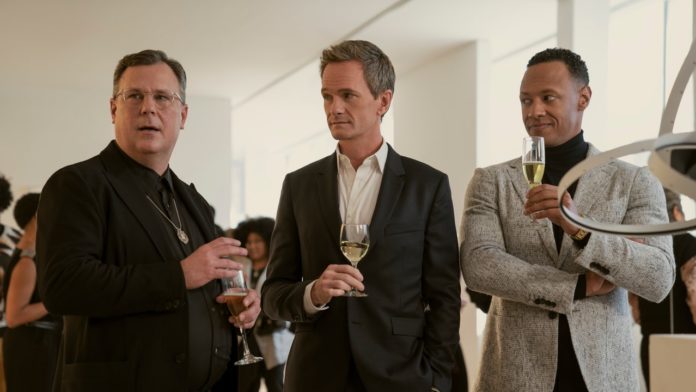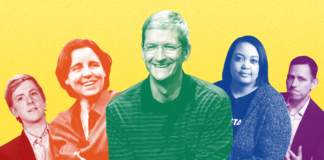
Last year’s And Just Like That shifted the gaze of the watershed series Sex and the City ever so slightly. The original gang was older; one was missing; and some new friends had arrived to complicate the party. While Sex and the City creator Darren Star wasn’t involved with And Just Like That, he perhaps wanted to do some riffing of his own, as evidenced by the new Netflix series Uncoupled (July 29). It’s a show that concerns the same fascinations as Star’s landmark series—New York City, romance, career—only from a gay perspective.
Explicitly, directly gay, that is. SatC and And Just Like That, while mostly about straight women, are very much filtered through a gay lens, though the gay characters—chiefly, nebbishy Stanford and harping Anthony—are often mere plot functionaries. Not so on Uncoupled, which puts a gay man, forty-something Michael (Neil Patrick Harris), front and center.
Star, with co-creator Jeffrey Richman, borrows SatC’s episodic dating format and rolls it up with the aging anxiety of And Just Like That, all the gassy middle-years jokes about the swift encroachment of technology and new sexual, social, and political norms. But Uncoupled does so lightly, with a flick of the wrist and a slosh of champagne. Uncoupled is topical in its references, but in a flustered, corny way, much like Star’s other Netflix series, Emily in Paris.
Those seeking a modern version of New York City itself will be unsatisfied. This is still a television Manhattan that turns its nose up at Brooklyn, that is allergic to the subway, that holds downtown as a place for hip restaurants and galleries but not suitable for sophisticated living. Michael is a high-end real estate agent, so the show spends a lot of time talking about property and neighborhoods in a way that is hermetically removed from the realities of today. (For all but a precious, terrible few New Yorkers, anyway.) There is, yes, a perverse pleasure to Uncoupled’s blithe indulgence, the guilty thrill of spending time in a world in which money is both no object and the only object. This does prove grating as the series wears on, though.
Where Uncoupled seeks innovation is in its romantic entanglements, mildly sociological and, oftentimes, sexually frank. Just before a surprise 50th birthday for Michael’s partner of 17 years, Colin (Tuc Watkins), the birthday boy tells Michael that he’s leaving the relationship. This sends Michael into a tailspin—and onto apps like Grindr, where he confronts a gay dating world vastly different from the one he knew before he settled in for his long domestic spell with Colin.
Theirs wasn’t an open relationship, which puts Michael at a distance from a lot of gay men a decade or so his junior. The advent of PrEP has helped create a sexual landscape utterly foreign to Michael, though he is at least familiar with many enduring hangups of his particular milieu: the tensions of top and bottom, bear and twink, daddy and, well, not daddy. While the discourse in Uncoupled is well trod already, it is at least something different to see those conversations play out in a romcom TV series about middle-age.
As Michael meets a host of men on his journey toward healing (pretty much a new guy per episode, like in the old SatC days!), his sidekick friends undergo their own misadventures. Himbo weatherman Billy (Emerson Brooks) spends his time bed-hopping and dating down on the age scale. The show teases him for that, but mostly avoids outright shaming; his choices are framed much in the same way that Samantha Jones’s were. Maybe Billy is pushing true love away with all his emotionless canoodling, but also, who cares? Stanley (Brooks Ashmanskas) is, as his name would suggest, more of a square, a lonely art dealer who’s ever self-deprecating about his age, his looks, his failed attempts at finding a mate. Again, though, Uncoupled is careful with its caricature. Or maybe it’s just Ashmanskas, who lends thoughtful shading to even the groaniest, most pathetic of lines.
Harris, for his part, is best when things get a little serious: when Michael and Colin bicker in the fallout of their breakup, or when Michael has some sad epiphany about the sudden shape of his life. His broader comedy is stiff—Harris is not the lightest of presences, so he has trouble with the show’s zanier, goofier material. Especially in contrast to Tisha Campbell, who plays Michael’s business partner, Suzanne. Campbell is a dynamic performer owed a bit more than she gets here, though the show does eventually give her a shred of a standalone plot. She also has a few jaunty scenes with Marcia Gay Harden, who plays (on old-pro autopilot) a snobby zillionaire divorcée looking to repair her life just as Michael is.
For all of its clunk and creak, Uncoupled is an agreeable watch. It’s daring enough in a few places to feel worthy of its era, while providing the easy, brain-deadening, trapped-in-amber enjoyment that has become a hallmark of Star’s work. (It should be said, though, that Sex and the City was, at its peak, actually quite stimulating.) In the scattered moments when Uncoupled’s slapdash topicality and hoary stereotypes give way to a jag of genuinely sharp writing, the series swells to fit its pedigree. The show isn’t Sex and the City, but nothing will ever be.
We’d probably do well to take heed of Uncoupled’s message, then. To stop all our useless pining for an old love we can never get back. And to engage in some halfhearted flirtation with something new and—maybe, just maybe—good enough for now.








